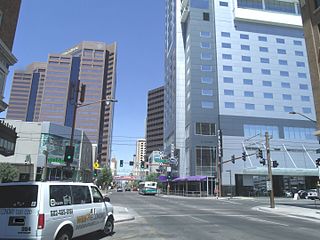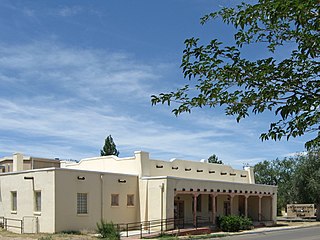
Coolidge is a city in Pinal County, Arizona, United States. According to the 2010 census, the city's population is 11,825.

Casa Grande Ruins National Monument, in Coolidge, Arizona, just northeast of the city of Casa Grande, preserves a group of Hohokam structures dating to the Classic Period (1150–1450 CE).

Swannanoa is an Italian Renaissance Revival villa built in 1912 by millionaire and philanthropist James H. Dooley (1841–1922) above Rockfish Gap on the border of northern Nelson County and Augusta County, Virginia, in the US. It is partially based on buildings in the Villa Medici, Rome.

This is a directory of properties and districts listed on the National Register of Historic Places in Arizona. There are about fourteen hundred listed sites in the state, and each of its fifteen counties has at least ten listings on the National Register. Forty-seven of the state's sites are further designated as National Historic Landmarks.

The Central Avenue Corridor is a significant stretch of north–south Central Avenue in Phoenix, Arizona. Roughly bounded by Camelback Road to its north, and McDowell Road to its south, this is one of Phoenix's most vital and heavily trafficked stretches of roads. It is also one of the region's largest centers of employment, with nearly 60,000 people being employed within a three-mile (5 km) radius of this swath of Central Avenue. Major employers here include major banks and financial institutions, hi-tech companies, and several significant law firms and government agencies.
Henry O. Jaastad (1872–1965) was an influential Tucson, Arizona architect. His firm created over 500 buildings and Jaastad was Mayor of Tucson for 14 years. A number of his works are listed on the U.S. National Register of Historic Places for their architecture.

The historic Buena Vista Hotel in Safford, Arizona was built in 1928 at cost of $80,000. The 2-story, 46-room hotel was built by Fred and Minta Waughtal, who owned the nearby Olive Hotel, and opened Oct. 15, 1929. It featured swimming pool and two bars; the Tap Room, and the Matador Room, which both featured live music and entertainment, including jazz and country and western music. The hotel closed in 1979 and was damaged in a fire. The building was demolished in 1994.

The Sharlot Hall Museum is an open-air museum and heritage site located in Prescott, Arizona. Opened in 1928 by Sharlot M. Hall as the Gubernatorial Mansion Museum, the museum that now bears her name is dedicated to preserving the history and culture of the Central Highlands of Arizona.

The Phoenix Historic Property Register is the official listing of the historic and prehistoric properties in the city of Phoenix, the capital and largest city, of the U.S. state of Arizona.
Michael Sullivan was a stonemason who in the 1920s built various historical structures of fieldstone in Casa Grande. He also built a monument in the town of Sacaton, Arizona, dedicated to Pvt. Matthew B. Juan, a Native American, who was the first Arizonan to die in World War I.

The Thompson Falls Women's Club, which has also been known as the Rinard House, at 210 Jefferson St. in Thompson Falls in Sanders County, Montana, was listed on the National Register of Historic Places in 1986.

The Alamogordo Woman's Club is a women's club based in New Mexico. It operates under the auspices of the New Mexico Federation of Women's Clubs (NMFWC). The club was created to provide Alamogordo women a way to serve their community. Of note was the Alamogordo Woman's Club's providing books to school libraries.

The Casa Grande Woman's Club Building, at 407 N. Sacaton Street in Casa Grande, Arizona, USA, is an historic women's club building which was listed on the National Register of Historic Places in 1979.

The Glendale Woman's Club was first organized in 1901 as a “Self Culture Club”, the primary aim of the Woman’s Club was self-improvement from a literary standpoint. They raised money for the first library and city parks. By 1907, membership had increased to fifty members and it became impossible to continue meeting in homes, so the group began to think of acquiring its own clubhouse. On February 21, 1912, exactly 1 week after Arizona became the 48th state, the Club was recognized 501c3 non profit corporation with 85 members. It took over the local library in 1918, which had been neglected during World War I, and, even after the library was moved to a municipal building, the club served the library until 1922. The Glendale Woman's Club is a member of the General Federation of Women's Clubs.

The Woman's Club of Topeka was named as an entity in 1916 but has earlier roots. Its building, located just one-half block west of the Kansas State Capitol and completed in 1925, was listed on the National Register of Historic Places in 1982.

The Woman's Club in Safford, Arizona, United States, is located at 215 Main and was built in 1930. It was listed on the National Register of Historic Places in 1988.















